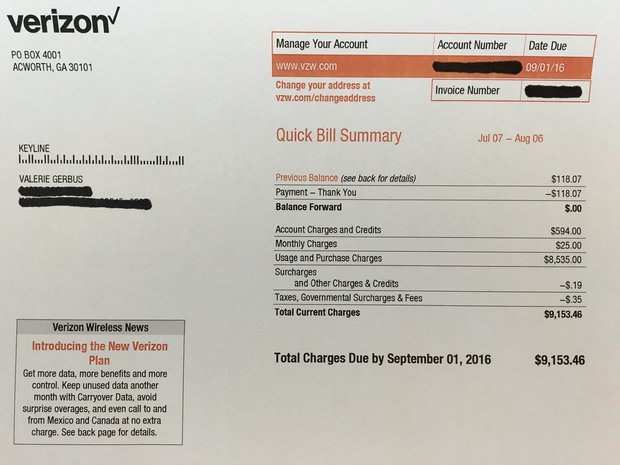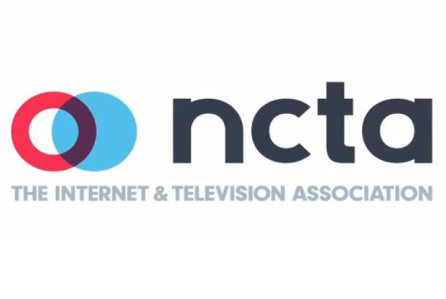 Some Verizon Wireless customers are reporting data usage numbers spiked on their bills to unprecedented levels this summer, giving the cellular company’s bean counters a heaping helping of overlimit fees, charged when customers exceed their data allowance.
Some Verizon Wireless customers are reporting data usage numbers spiked on their bills to unprecedented levels this summer, giving the cellular company’s bean counters a heaping helping of overlimit fees, charged when customers exceed their data allowance.
The phantom usage problem has become noticeable enough to win attention from the consumer reporter at Cleveland’s The Plain Dealer, who found her own family of four suddenly blowing past their shared 15GB a month, resulting in a $30 overlimit fee.
“My family’s data usage has mysteriously increased significantly every month since February, except for one month,” wrote Teresa Dixon Murray. “My family of four pays for 15GB a month. We’re grandfathered in the old More Everything family share plan. We typically were using no more than 10GB a month. But for the last six months, that has increased steadily — and inexplicably. 8.2. Then 9.7. Then 10.6. Then 12.7. Two months ago, we got alerts that we were nearing our allotment and managed to take care to avoid going over. Last month, despite our efforts, we went over by 1.057GB, and were charged an extra $30.”
Murray questioned why her family’s phones were burning through their data allowance in the middle of the night, while connected to the family’s home Wi-Fi.
A Verizon representative explained phones may be connecting to Verizon’s network because of a new feature installed on some phones, including the Apple iPhone, called “Wi-Fi Assist.” This feature, which could also be called “Verizon Profit Assist” automatically ignores the fact you are connected to Wi-Fi and switches back to the Verizon Wireless network if the phone determines your Wi-Fi connection is “poor.”
“So what’s the definition of poor? I guess Verizon and our iPhones decide that,” Murray questioned.
This feature can be switched off from your phone settings.

They are coming.
But that hasn’t always stopped the overlimit fees. Some customers report they still incur overlimit fees even after switching cellular data off when they reach a warning from Verizon they are about to exhaust their allowance. Verizon charges $10 in overlimit fees, even in instances where the offending extra usage amounts to .0001GB.
Verizon claims its usage meter only provides an estimate of usage, and there are instances where the warning comes too late for a customer to stop using data before they’ve already exceeded their plan allowance. Verizon’s solution is to sell a $5/month “family coverage” add-on that allows parents to monitor data usage before it gets out of hand. But Verizon doesn’t guarantee it will stop overlimit fees based on the measurements of usage it provides.
That add-on plan may or may not have helped Valarie Gerbus, who is now facing a $9,100 Verizon cell phone bill she is adamantly refusing to pay.
The suburban Tampa customer regularly paid $118/month for her cell phone plan, which included 4GB of data usage — an amount she never exceeded, at least until July. Gerbus was shocked to open her bill and discover her normal monthly bill now also included $8,535 in overlimit fees for using 569GB of data in a single month:

(Image: The Plain Dealer)
On July 21, Verizon sent her a text, notifying her that she had used nearly all of her 4 gigabytes of data. The text said she could get 4 more gigabytes for $20. Realizing that she had two weeks before the end of the month, Gerbus bought the additional data.
Within an hour of the purchase, she received another text that told her she only had 10 percent left on the data that she had just purchased. The next text message she received said she could change her plan to 8 gigabytes for an additional $20 a month. She said she bought that upgrade to ensure she didn’t have any data overages.
In a span of several hours, she estimates that she received 40 to 50 texts saying that she needed to purchase more data. She turned the notification off, believing that there had been a glitch in Verizon’s system.
Gerbus said she realizes now that she should have contacted the company at that point, but she didn’t, as she feared being placed on hold by a customer service representative.
She later went to work and planned on paying the bill online. When she found her online statement, it said she owed $6,480 for using 490 gigabytes of data. She was shocked.
“I told them that I won’t pay the bill,” Gerbus told the newspaper. “I can either wait until they take it to a collection agency or when they take it to court. Either way, my credit history will be ruined. I can go bankrupt here.”
Verizon said they are not aware of any widespread problem, but is looking into phantom phone usage at night and some of the more extreme examples of bill shock, where bills extend into the thousands of dollars.
Affected customers report the high bills are, in some cases, tearing families apart.
“It got to the point that we were battling in our family,” reported Lockport, N.Y. resident Tom Walker, who told the newspaper their data usage soared for no apparent reason. “We were really asking each other, ‘Have you been on Facebook too much? What have you been doing?’ We were trying to figure out who was using all this data.”
Gerbus is almost thankful to pay Verizon Wireless a nearly $600 fee to exit her contract early as she switches to T-Mobile. Verizon’s engineers have no explanation for Gerbus’ bill, other than noting her phone contacted Amazon.com at least 400 times over a few days.
Providers with usage caps and usage-based pricing often consider their usage meters more reliable than their own customers, and when customers complain, many representatives trust the meter and insist on payment. When a customer like Gerbus complains about usage that is considerably above average usage, customer service representative are not always receptive.
“I told them that there was no way that I could have gone from 490 to 560 in a day,” Gerbus said. “The [Verizon] person said, ‘Yes there is.'”



 Subscribe
Subscribe The country’s largest cable industry lobbying group has decided to drop the word “cable” from its name, rebranding itself NCTA – The Internet & Television Association.
The country’s largest cable industry lobbying group has decided to drop the word “cable” from its name, rebranding itself NCTA – The Internet & Television Association.
 The Berkshire Eagle covered an open meeting held last night at the Great Barrington Firehouse, where residents and officials wondered why they could only lease a cable box from Charter, and
The Berkshire Eagle covered an open meeting held last night at the Great Barrington Firehouse, where residents and officials wondered why they could only lease a cable box from Charter, and  Some Verizon Wireless customers are reporting data usage numbers spiked on their bills to unprecedented levels this summer, giving the cellular company’s bean counters a heaping helping of overlimit fees, charged when customers exceed their data allowance.
Some Verizon Wireless customers are reporting data usage numbers spiked on their bills to unprecedented levels this summer, giving the cellular company’s bean counters a heaping helping of overlimit fees, charged when customers exceed their data allowance.

 Walmart is recommending customers consider cutting off cable television for good with
Walmart is recommending customers consider cutting off cable television for good with 